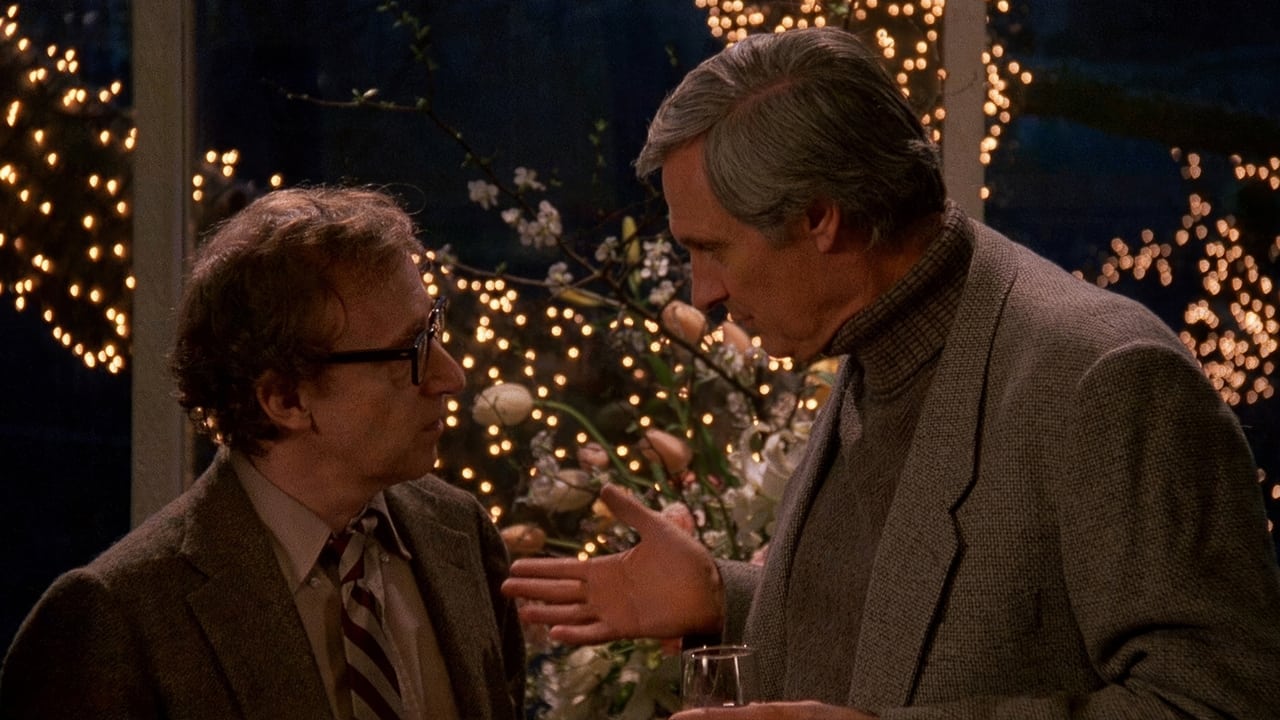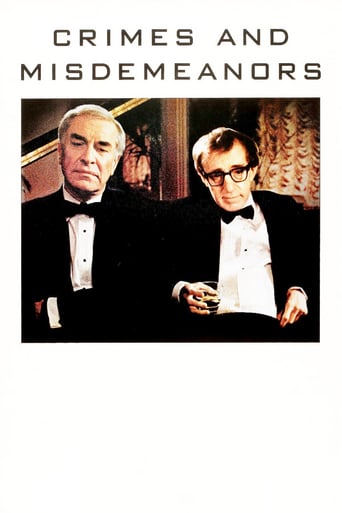

Wonderful character development!
... View MoreIf the ambition is to provide two hours of instantly forgettable, popcorn-munching escapism, it succeeds.
... View MoreExcellent and certainly provocative... If nothing else, the film is a real conversation starter.
... View MoreStory: It's very simple but honestly that is fine.
... View MoreThe Three Acts:The initial tableaux: Ophthalmologist Judah is successful and respected. However, he's been having an affair with Dolores. Dolores wants to bring up the matter with Judah's wife Miriam, and clear the air. Judah would rather not.Cliff is a maker of small films who has little success. His wife Wendy speaks to her brother Lester, who is very successful in Hollywood. She convinces Lester to get Cliff a job filming a biography on Lester. Cliff takes the job in order to fund his own projects.Delineation of conflicts: Lester does not really want Cliff to direct his biography, but he does it as a favor to Wendy. Cliff does not want to do the piece, since he has no respect for Lester's pomposity. Cliff tries to connect with Halley, Lester's producer, in order to get additional funding for his documentary on Professor Levy. Filming Lester being Lester is a grand pain for Cliff.Judah wants to break up with Dolores, but Dolores has other ideas, which include seriously fouling up his personal and professional life. Jack suggests a solution to Judah's problem, but Judah has qualms. Ben, Judah's rabbi and patient, counsels him to take the higher road: let the meeting happen, let disclosure happen, keep a clear conscience. Dolores escalates, so what does Judah do?Resolution: Judah needs to solve his moral, financial, and personal dilemmas. Cliff needs to find his own success, and perhaps reignite his married life.
... View MoreThis is about as close as Woody Allen is likely to come to real tragedy. Martin Landau is having an affair but his paramour threatens to lower the boom on him by telling Landau's wife. Landau arranges to have his love murdered but is stunned by what he has gone, haunted by moral lessons learned from a rabbi when he was a child, and ends the movie thoroughly chastened but not in jail. He gives a subtle performance too.That's what is know as "the A story." The "B story" has Woody Allen as a documentary film maker in love with Mia Farrow, who is in love with Allan Alda, an egotistical, famous, rich nincompoop. The egotistical, famous, rich nincompoop gets the girl, while Allan's marriage dissolves, leaving him forlorn.Well, okay. It's not King Lear. But it's enjoyable and at times slyly thought provoking. (Is it really necessary to believe in God and an afterlife of punishment in order to feel guilt?) A rabbi, done to a turn by Sam Waterston, represents God and has gone blind. The symbolism is clear but the meaning is nebulous. The scenes of Jewish rituals are semi-real and heartwarming, like low-key versions of John Ford's weddings and dances.Allen's job is making a documentary film about Allan Alda, whom he loathes. Alda is foolish and, furthermore, he's got first dibs on the girl Allen loves. So the documentary, which is supposed to make a public icon out of Alda, turns out to be a disaster -- scenes of Alda shouting and bragging, intercut with shots of Mussolini on his balcony haranguing his fascist supporters, Alda copping a feel in a dark hallway. During the viewing of the film, we see Woody Allen seated in the theater and chuckling at his own cruel wit. Alda sits there aghast, his mouth open, and then fires Allen on the spot.Of course, the film is necessarily cluttered with Woody Allen's conversational tropes. "How AHHH you?" And, "I just feel, I don't know, unsettled. Y'know?" And Allen's compulsive wisecracks are up to par: "The last time I was inside a woman was when I visited the Statue of Liberty." Lots of dinner parties with guests, a wedding, a sentimental dance. The conversations are incredibly middle-class and banal -- the virtues of acupuncture and the center piece at Rockefeller Center. But the pace is deliberate, and the staging precise, as befits a tragedy.I preferred the B story to the A story. They weren't seamlessly blended. Yet it's watchable and diverting, and odd to see Woody Allen so seriously probing a concept like guilt.
... View MoreCrimes and misdemeanorsCrimes and misdemeanors is a film by Woody Allen. In the leading roles there is him as Cliff Stern, Martin Landau, Anjelica Huston, Mia Farrow. The film has two different stories developing at the same time. The first one is a drama about an opthalmologist (Martin Landau), whose mistress (Anjelica Huston) wants to tell to his wife about their affair, otherwise she threatens to reveal that he is a corrupted man. The second one is a romantic comedy about a TV writer (Woody Allen) who falls in love with a woman (Mia Farrow) with whom he works, while he deals with his successful brother-in-law.First of all, Woody Allen is the same guy as always. The same character, with the same profession, dealing with the same erotic problems, with the same way of thinking, with the same cynicism. I understand that this is him, but at least he could change some things on the character.Second, I barely see a connection between the two stories. I waited to see where the two stories are heading to, to find out the two main characters make a conversation about life. I just don't see a reason why there should be two different stories. Each one is good enough to be a single movie, the first a crime drama and the second a typical Woody Allen romantic comedy.Still, I liked the ideas about life that come out of the stories, especially the first one. About how time makes us forget and forgive and how the first impression of someone or something could be totally wrong.The soundtrack was good and so was the acting, although many characters were useless as they only served the connection between the stories, like the rabbi.Not a good effort to make a complex film. I wouldn't recommend it as there are far better films to watch. I give it 4/10
... View MoreWoody Allen is not everybody's cup of tea, with me while his body of work is not always consistent(but that is true with a lot of directors) much of it is wittily written and insightful as seen with his masterpiece Annie Hall. Crimes and Misdemeanours has everything that is so good about the best of his work. With the subject matter and how the comedy and seriousness is blended Crimes and Misdemeanours is one of Allen's most ambitious, and along with the likes of Annie Hall, Hannah and Her Sisters, Husbands and Wives and Manhattan it's one of his best too. The look of the film is elegant and hauntingly dark, while the score is jazzy and seductive. The story has some key themes(good and evil and life and death as examples) that are very clearly addressed and dealt with with adroitness and truth. The concept is not an innovative one as such but it's challenging and hugely compelling. And the writing is to thank for that, the humour is wonderfully ironic and very characteristic of the distinctive wise-cracking Allen style, there are references and observations that are sharp and insightful(always one of Allen's strong points as a writer) and they is blended well with a serious tone that is dark and appropriately troubling, the shifts between comedy and drama didn't jar to me. The acting is very good, often outstanding. Woody Allen acts as well as directs and writes and there are no obvious problems with his performance(or his directing), not a likable character by all means but that was the intent. Anjelica Huston doesn't disappoint, nor does Jerry Orbach before his Law and Order days, Sam Waterson and Claire Bloom. Mia Farrow is affecting as well. But the acting honours go to Alan Alda and especially Martin Landau, Alda plays an absolute weasel to perfection while Landau gives a performance that has not only only been matched by his Bela Lugosi in Tim Burton's Ed Wood but also one of the greatest performances of any Woody Allen film. All in all, a Woody Allen classic, an example of ambitious done brilliantly. 10/10 Bethany Cox
... View More